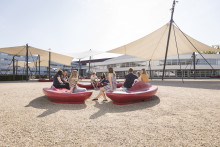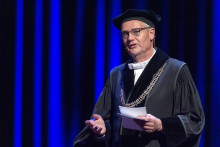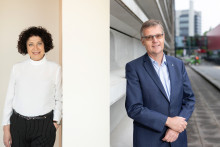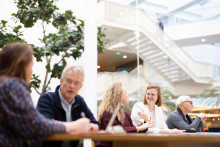Is the university aiming for a hybrid form of education and work?
Machteld Roos: ‘Our strategy and vision, Shaping 2030, already includes a lot about working on campus and at home. Campus is and always will be very important for our community, but we see other possibilities. We see that people are experimenting and starting a dialogue about how and where to work.’
Tom Veldkamp: ‘The online dimension is here to stay. Especially in the context of uncertainty, because the pandemic is not over yet. As people surely remember, we had a very quick transition to online education and through this process we also learnt what doesn’t work. The challenge was always hybrid education, meaning a lecture when some students are in the classroom on campus and others are at home. In this form, teachers often had to sacrifice the interaction with students and it was only one group of students that received the attention. That is why we are moving towards blended education. This should include recording of lectures, which the students can watch at their leisure, and then organize interaction on campus; because interacting with teachers and peers is the added value of being on campus.’
Is this the plan for the next academic year already?
Veldkamp: ‘Not everything will be ready as of the 1st of September. It will take time, but this is the direction we are heading. We don’t have an overview of how many teachers already took the step towards blended education and we don’t want to add extra work pressure. However, we are not going back to old-fashioned lectures like before the pandemic. We want to be corona-proof. We hope that by offering both online and offline options, we will become more resilient and serve both students who are on campus, as well as students who might not be able to physically come. Practicals and other interactive forms of education should take place on campus, because students also need to learn the value of coming here.’
How about work? What can employees expect?
Roos: ‘It goes parallel with education and we see that many employees have adopted blended working. The pandemic brought a lot of challenges. Once again, hybrid meetings when some colleagues are physically present and others are online, have been a challenge. But there have also been a lot of good things that we want to keep.’
Will the Executive Board provide clear rules valid for the whole university?
Roos: ‘We share best practices, but no obligations. We have come up with general guidelines, but not any strict rules. It remains important for employees to regularly come to campus. Nobody will fully work from home. But it is not an obligation to work on campus or at home. It is not one size fits all. Everyone has a different job, different lifestyle and life phase. We want to be able to customize the solutions, so it’s suitable for the individual, the team and the organisation. It’s important to have open dialogues about this.’
Do you have an overview of how many people would prefer to partly study or work from home?
Roos: ‘Based on surveys, we know that 73% of UT employees would like to work from home at least two days a week. About 9% indicated a preference to fully work on campus. These numbers would probably be very different three years ago. There has been a big shift.’
Veldkamp: ‘It’s also important to note that productivity of people didn’t decrease during the pandemic. For some it even increased, because there was nobody to stop them from working, so to speak. For some it was difficult to find the right balance. And this was also an issue for students, who were suddenly only studying at home. In many cases, it badly impacted their wellbeing, which is why I hope we can keep society and the campus open.’
Is there a road map in case a new pandemic emerges again?
Roos: ‘The national government has come up with a list of possible scenarios and asked all institutions to prepare plans for each of them. We are busy with that right now.’
On a practical note, is there even enough space on campus for all students, lessons and employees?
Veldkamp: ‘When it comes to teaching: no, there isn’t sufficient space available for our current number of students. Which is why we asked all programmes to organize 20% of education online. The situation is certainly not ideal, but it should not stop students from coming to campus. There is a lot of spaces for informal meetings.’
Should study programmes also count on organizing 20% of courses online in the next year?
Veldkamp: ‘For now, that is the idea, but in the long-term we will of course try to create more spaces. If people spend a lot of time at home, maybe we need to rethink how we organize our space. This still needs to be properly discussed, though. Nothing has been decided. This is an unexplored territory for us.’
If the UT strives for providing education and work primarily on campus, are all perspectives sufficiently taken into account? For example, students with disabilities or chronic illness actually had more opportunities to participate in classes remotely.
Veldkamp: ‘That is true. Quite a lot of students are happy with having more online options. We hope that blended education will provide more possibilities. We will certainly continue to support students with any sort of disability. We don’t want to have any thresholds, we want to be an inclusive university and make it possible for everyone to join. We need to find a more balanced approach.’
Roos: ‘A lot of people have indeed appreciated being able to work from home, because it gives them more options and allows them to create the right work-life balance. We believe that the blended approach will provide a more inclusive environment. It’s good for our community. It also expands the region. If you can partly work from home, you become more attractive as an employer. You can also see that in our Executive Board. We all live outside of Twente. We generally work three days a week on campus and two days at home. We try to set an example for blended working.’
If understood correctly, it will be up to each person and department to organize their work?
Roos: ‘Absolutely. Our guidelines provide a direction, but there is enough space for everyone to customize them.’
Veldkamp: ‘Education naturally needs to be scheduled, so there are limitations in that regard. Let’s say: it’s work in progress. We live in times when we need to adapt very quickly.’
Roos: ‘Indeed. And we are a learning organization. We learn and adapt. It’s an expedition which we are all taking together.’







